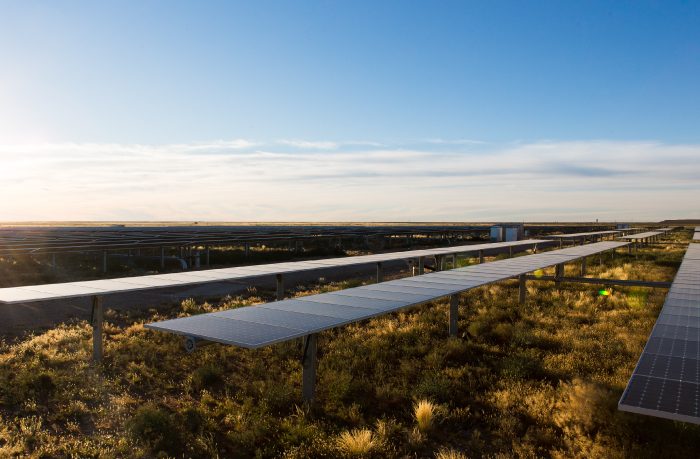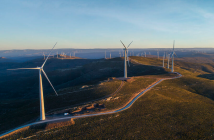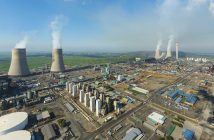- The project is reportedly experiencing serious problems due to premature module degradation.
- Claims of widespread backsheet failure have emerged and it is said widespread module replacement will be required.
- The modules used in the project were supplied by Chinese manufacturer BYD and South African producer Artsolar.
- This article is part of an ongoing investigation by Green Building Africa and pv magazine into difficulties at the South African project.
The ZAR1.3 billion (US 91 Million) Mulilo Sonnedix Prieska solar farm appears to be encountering significant problems. Reports from insiders involved with the project indicate backsheet degradation is affecting power output and widespread module replacement may be necessary.
The 75 MW solar project was commissioned on 22 July 2016 with much fanfare. At the time, Spanish renewables company Sonnedix announced the facility was its first plant in South Africa and the biggest in its portfolio.
The milestone project was developed with South African developer Mulilo Renewable Energy and renewables company Ixowave Women in Power, and was built for Spanish IPP Sonnedix by the juwi Renewable Energies (Pty) Ltd South African subsidiary of the German juwi group, under the leadership of MD Greg Austin.
Green Building Africa approached Austin for comment about the problems at the Prieska site.
“We cannot comment on the quantum or the assertion regarding factory defects and/or underperformance, as this kind of information is confidential within projects and the project structures are such that issues such as these that may occur are managed and solved through the related project documents,” Austin said in a statement.
The South Africa unit MD added: “All relevant parties to the project are subject to strict non-disclosure and confidentiality obligations in the construction contract, the sub-contracts and the agreements with [South African utility] Eskom and [the]government. As such, neither we nor any other party in the project are entitled to deal with any information that is confidential to the project, and so are simply not entitled to comment on anything you have raised, irrespective of its accuracy or otherwise.”
pv magazine and Green Building Africa have spoken with South African PV industry insiders who have confirmed plant remediation work, which may include replacing failed modules, is under way.
Project developer Mulilo has confirmed BYD was module supplier for the Mulilo Sonnedix Prieska site. It is one of three large scale solar projects Mulilo developed at Prieska, in the Northern Cape province. A second 75 MW project was completed in August 2016 which used modules supplied by SunPower. The U.S. module manufacturer, which is owned by French oil and gas group Total, also supplied engineering, procurement and construction [EPC] services on that project.
Questions remain as to the provenance of the modules used on the Prieska project.
In early 2016, South African module maker Artsolar claimed it was supplying some of the modules used at the Mulilo Sonnedix project. At the time, Artsolar director Derek Lawrance said: “These PV modules were manufactured at the Artsolar plant in KwaZulu-Natal for the Mulilo Sonnedix Prieska PV solar plant project. This plant, which supplies the electricity it produces to the Eskom Kromos substation in the Northern Cape, is the first 75 MWac size REIPPP [Renewable Energy Independent Power Producer Program incentives regime] project to have PV modules produced by a South African-owned company.”
BYD has not replied to Green Build Africa and pv magazine’s enquiries. Sonnedix and Mulilo would not confirm the plant is under-performing.
Referring to the Mulilo Sonnedix project, Artsolar said: “A substantial amount of the panels are from our facility … but certainly not all.” The manufacturer produced the modules on an OEM basis for BYD.
The challenges at the Mulilo Sonnedix Prieska project illustrate the importance of sourcing durable modules for use in hot climates. High temperatures have been shown to cause more frequent backsheet failures – an issue particularly prevalent in rooftop projects, where temperatures are typically 15 degrees Celsius higher than for ground-mounted arrays.
The South African grid has been subjected to an extended load shedding program because of electricity supply problems attributed to the country’s coal-fired generation assets. As a result, the nation can ill afford its solar power generation facilities to under-perform.
Mulilo Sonnedix Prieska 75 MW Solar Project profile:
- 75 MW solar PV
- Location: Copperton, Northern Cape
- EPC: Juwi
- Operations and maintenance: Juwi
- Mounting: Fixed structure, drilled and rammed rock anchor
- Module supplier: BYD Solar Modules, 315Wp
- Inverters: ABB
- Lender: Nedbank and Standard Bank
Authors: Bryan Groenendaal/Jonathan Gifford












1 Comment
This is an interesting cahllenge and hence the Council for Scientific and Industraial Research (CSIR) has established a solar photovoltaic module quality and reliability testimng laboratory (Please see link below)
https://www.csir.co.za/photovoltaic-testing-facility